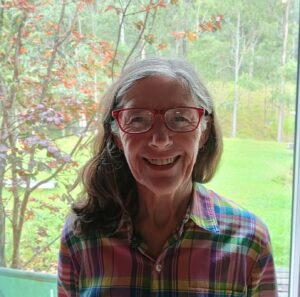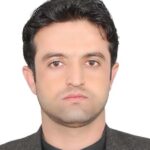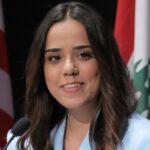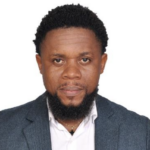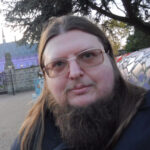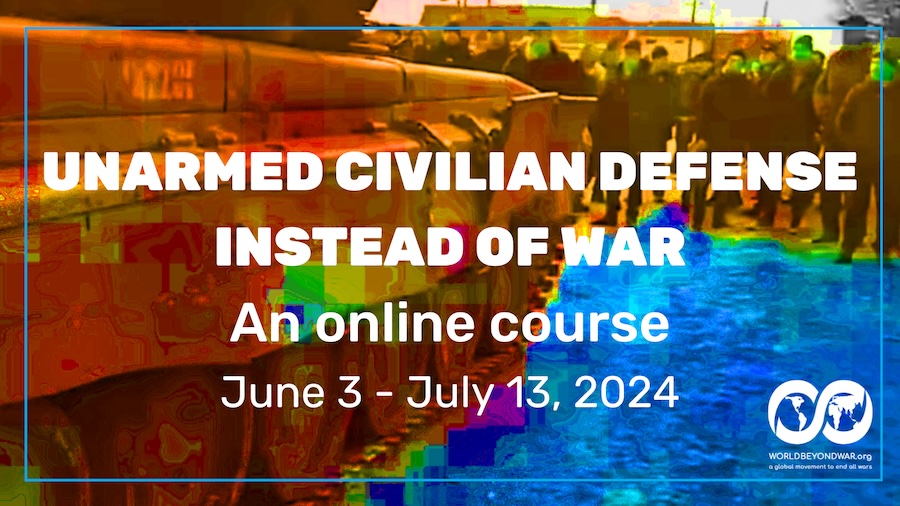
What should innocent people impacted by war do when their homes are invaded by the military? What choice do they have but to fight back with violence?
This 6-week online course provides an in-depth introduction to unarmed civilian defense (UCD) with a focus on the role it can play in resisting military force, invasion, occupation, dictatorship, and warfare.
Through real-world examples, conceptual resources, practical tools, and collaborative learning experiences with a globally diverse cohort of experts and peers, you’ll develop a firm grounding in the academic understanding and practical applications of non-violent alternatives to war.
Course Summary
Format: Online Course
Start Date: Monday, June 3, 2024
Duration: 6 Weeks
Time Commitment: 3 to 6 hours per week
Cost: On a sliding scale from $25 to $100 or more if you can afford it. Tickets are non-refundable
Course Summary
Format: Online Course
Start Date: Monday, June 3, 2024
Duration: 6 Weeks
Time Commitment: 3 to 6 hours per week
Cost: On a sliding scale from $25 to $100 or more if you can afford it. Tickets are non-refundable!
About The Course
- Learning Experience
- Course Highlights
- Instructors
- Who is the course for?
The course is structured around three components: 1) A Six-week Online Course; 2) Three Interactive Live Sessions; and 3) and an End-of-course Strategy Game.
1) Six-week Online Course:
The course consists of six core modules, covering the following:
Module 1: Unarmed Civilian Defense: What is it?
Gain a foundational understanding of the aims, uses, main features, benefits, and challenges of unarmed civilian defense (UCD), while questioning assumptions shaping contemporary peace and security policies and practices today, such as the notion that military forces are required to keep us safe and advance the prospects for peace and security.
Module 2: What Has UCD done thus far, and what potential does it have?
Access a growing repository of successful real-world examples that employed non-violent actions instead of war. Spanning the globe from Ukraine to Palestine, Colombia to South Korea, Czechoslovakia to South Africa, and beyond, these examples cover a broad spectrum of tactics, including preventing coups, blocking tanks, talking soldiers out of fighting, pushing soldiers out of areas, preventing a NATO military training ground, overthrowing dictators, achieving political and economic reform, ending occupations, undoing military coups, winning multi-party democracy efforts, influencing the ending of apartheid, achieving independence, and more. These examples – from diverse locations and populations, using diverse tactics – offer inspiration for what might be done elsewhere and serve as models for others to follow. They also point to the potential of UCD to not only resist foreign intervention but also to promote the development of more inclusive decision-making processes and representative democracies.
Module 3: What can individuals and organizations do?
Reflect on your journey toward being and becoming a peacebuilder. Leverage actionable frameworks and models to explore your own identities and roles as a peacebuilder and/or agent of social change. Gain knowledge, resources, and tools for studying and practicing nonviolent alternatives to war. This includes taking a closer look at some of practicalities involved in carrying out UCD interventions, including vital guidance on the entire process, from how to effectively design and implement interventions to monitoring and evaluating the results throughout.
Module 4: What can governments do?
Explore successful examples of how governments, instead of solely emphasizing military defense, have demonstrated commitments to UCD principles and practices. From nations without militaries in places like Costa Rica and Iceland to liberating themselves from Soviet occupation, and developing unarmed defense plans, in Lithuania, Latvia, and Estonia, these examples show how governments can enable, invest in, and collaborate with others to pursue alternative non-violent strategies for national defense and the promotion of peace and security. For balance, analyze less successful examples from around the world, including contemporary situations in countries like Sweden and Finland, to explore how historically neutral nations are aligning with military alliances and becoming more militarized – and learn about the actions ordinary people can, must, and are taking to address these concerning trends.
Module 5: What is the role of communications and media in effective UCD?
Delve into how communications and media shape perceptions of war and peace, exploring some of the lies told in war propaganda such as the need for military alliances like NATO and the notion that militaries make us more safe and secure. Additionally, gain tools, frameworks, and strategies for advancing effective written, digital, and verbal communication. This includes knowledge and guidance on how to write-up work, tell compelling stories, convey complex information, engage with the media, create/disseminate content, and talk about peace and war – all helping to facilitate clear and concise communication, amplify the message, engage diverse target audiences, and achieve better outcomes.
Module 6: Putting it all together
Reflect on the content and ideas contained in the course, including a summary of key takeaways and recommendations to help inform the study, practice, and communication of UCD. Explore ideas about the future of peacebuilding, plan for your next steps, and consider avenues for continued engagement in the global nonviolent movement to end war, after the course finishes.
This course is 100% online and interactions are not live or scheduled, so you can take part whenever works for you. Weekly content includes a mix of text, images, video, and audio. Online discussion forums provide spaces for mutual learning and exchange, where facilitators and participants can ask questions, share challenges faced, and explore issues relevant to the weekly content. Facilitators also provide feedback on optional assignment submissions.
Time commitment/expectations: How much time you spend and how deeply you engage is up to you. At a minimum, you can expect to spend between 1-2 hours a week if you only review the weekly content. We hope you’ll engage in the online dialogue with peers and experts, as this is where the real richness of the learning occurs. Depending on your level of engagement with the online discussion you can expect to add another 1-3 hours a week. Finally, participants are encouraged to complete all six optional assignments (required to earn a certificate). This is an opportunity to further engage with and apply the ideas explored each week. Expect another 2 hours a week if you pursue these options.
2) Three Interactive Live Sessions:
The three 1-hour optional Zoom calls are designed to facilitate a more interactive and real-time learning experience:
- Zoom Call #1: Introductions
Tuesday, June 11, 2024 • 11:00 AM • Eastern Daylight Time (US & Canada) (GMT-04:00) - Zoom Call #2: Reflections on the course thus far
Tuesday, June 25, 2024 • 11:00 AM • Eastern Daylight Time (US & Canada) (GMT-04:00) - Zoom Call #3: Course Reflections. What next?
Tuesday, July 9, 2024 • 11:00 AM • Eastern Daylight Time (US & Canada) (GMT-04:00)
3) End-of-Course Strategy Game
Apply what you have learned in a three-hour online Strategy Game designed to help you deepen your understanding and real-world application of course content. This will take the form of an extended role play experience, where participants are divided into groups representing various key stakeholders such as the government, the media, students, educators, unions, transportation workers, the invading army, and the UCD force, etc. This interactive simulation has played an important role in helping people understand how UCD works and lessons we can learn to improve its effectiveness. Throughout the workshop, participants will have the opportunity to apply some basic peacebuilding skills, including active listening, teamwork, strategic planning, problem-solving, negotiation, and conflict resolution.
- Build Capacity. Improve your knowledge and impact as a peacebuilder, and learn how UCD can be used instead of war and armed conflict.
- Scholarly Rigor. Ground your work in evidence, drawing upon empirical research, theoretical works, and real-world practices from across the globe.
- Practical Application. Apply your learning through online learning experiences, hands-on participatory activities, and experiential practices.
- Build your network. Engage and exchange ideas and practices with a globally diverse cohort of peers who are connecting around issues of peace and war.
- Expert-guidance. Learn with and from distinguished guest facilitators, as well as World BEYOND War staff and board members, who bring decades of experience in peace and anti-war education, activism, and communications.
- Network Expansion. Join a vibrant global community dedicated to ending war, including access to the 2900+ strong alumni network whose members meet regularly in spaces for dialogue, learning, and professional growth.
- Stay Informed. Access an extensive array of peace and anti-war resources to inform and guide your present and future endeavors.
- Create Content. Leverage diverse communication methods – including written, digital, audio, and video – to amplify your work and engage with a broader audience.
- Reflective Practice. Discover frameworks and tools to reflect on your developmental process of becoming a peacebuilder.
- Earn a certificate as evidence of your learning and achievements from an award-winning anti-war organization.
- Future opportunities. Become involved in the broader work of World BEYOND War by creating/joining WBW chapters and affiliates around the world, where you can access additional support to inform your anti-war work.
Module 1: Unarmed Civilian Defense: What is it? June 3-9 Facilitator: Dr. John Reuwer (USA)
John Reuwer is Treasurer and a Member of the Board of Directors of World BEYOND War. He is a retired emergency physician whose practice convinced him of a crying need for alternatives to violence for resolving tough conflicts. This led him to the informal study and teaching of nonviolence for the last 35 years, with peace team field experience in Haiti, Colombia, Central America, Palestine/Israel, and several US inner cities. He worked in South Sudan with the Nonviolent Peaceforce, one of the few organizations practicing professional unarmed civilian peacekeeping. He also serves on the Committee to Abolish Nuclear Weapons with Physicians for Social Responsibility educating the public and politicians about the threat from nuclear weapons, which he sees as the ultimate expression of the insanity of modern warfare, so blatantly displayed in the current war in Ukraine. John has been a facilitator for World BEYOND War’s online courses “War Abolition 201” and “Leaving World War II Behind.” | |||
Module 2: What Has UCD done thus far, and what potential does it have? June 10-16 Facilitator: Dr. Karen Kennedy (Australia)
Karen is an agroecology farmer and an academic. She has an MA(Res) from the Centre for Peace and Conflict Studies, University of Sydney Australia (2012) and a Doctorate from the University of New England (2022) in arts and social sciences that focuses on alternatives to war. Karen has taught on a range of social science subjects including political theory, communications theory and ideas in history. She has been involved in various nonviolent movements and research groups including Schweik Action, https://www.bmartin.cc/others/SAW.html and XR. Since 2014 she has been co creating a sustainable off grid farm in regional NSW. | |||
Module 3: What can individuals and organizations do? June 17-23 Facilitator: Omid Wali (Afghanistan)
Omid Wali, currently pursuing a Ph.D. at Aligarh Muslim University in India, previously served as a distinguished Professor of English and Peace Studies at Nangarhar University, Afghanistan. He has contributed significantly to academia, authoring various works such as the Portfolio Development Project and as a co-translator of ‘Peace and Conflict Studies: An Introduction, as well as being honored with prestigious awards, such as a Fulbright fellowship at the University of Georgia, Athens, USA, where he taught Pashtu language and the Culture and History and Rotary Peace Fellowship, and Rotary Peace Center, which enabled him to study Peace and Conflict Resolution at Chulalongkorn University, Bangkok, Thailand. Beyond academia, Wali has amassed rich practical experience in pivotal roles within national and international organizations dedicated to peacebuilding, education, and empowerment in Afghanistan. This includes organizations such as the International Rescue Committee (IRC), British Council, American Council, United for Change Center, USA, and the United States Institute of Peace (USIP). Omid Wali holds a B.A. in English from Nangarhar University in collaboration with San Diego State University, USA, a Master’s degree in English Language Teaching (ELT) from Andhra University, India, and Master’s in Policy and Public Administration from the same institution. | |||
Module 4: What can governments do? June 24-30 Facilitator: Balkis Chaabane (Tunisia)
Balkis Chaabane is an award-winning peace & security practitioner and researcher, youth engagement expert and program design specialist with over 7 years of work experience internationally. Balkis has worked with several organizations around the world namely with the UN, IREX, USIP, MYCP, Politicq4Her, World Youth Alliance, USAID and many more. She has advanced experience in training on human rights and safe & effective activism, youth-inclusive peacebuilding and online engagement programs with an innovative approach in the Middle East & Africa. Balkis is fluent in three languages and currently holds several positions working as a Program Manager with the African Middle Eastern Leadership Project, Young Global Fellow in Foreign Policy with the Geneva Center for Security Policy, and as a Youth Researcher with USAID in Tunisia. Balkis has recently obtained her MA in International Affairs from the Lebanese American University (LAU) in Lebanon as the recipient of a highly competitive & prestigious US State Department Scholarship: the MEPI Tomorrow’s Leaders Graduate Program. | |||
Module 5: What is the role of communications and media in effective UCD? July 1-6 Facilitator: Luther N. Mafalleh (Liberia)
Luther N. Mafalleh is a social and development worker, Media for Peace Trainer, multimedia Consultant, Rotary Peace Fellow, Rotary-IEP Positive Peace Activator, IEP Peace Ambassador, and a filmmaker with more than 15 years of professional and progressive experience working in Liberia. | |||
Module 6: Putting it all together, July 7-13 Facilitator: Dr. Yurii Sheliazhenko (Ukraine)
Yurii Sheliazhenko, PhD, is a Member of the Board of Directors of World BEYOND War. He is based in Ukraine. Yurii is executive secretary of the Ukrainian Pacifist Movement, a board member of the European Bureau for Conscientious Objection, and a council member of the International Peace Bureau. He obtained a Master of Mediation and Conflict Management degree in 2021 and a Master of Laws degree in 2016 at KROK University. In addition to his participation in the peace movement, he is a journalist, blogger, human rights defender, and legal scholar, an author of academic publications and a lecturer on legal theory and history. He has been a facilitator for World BEYOND War’s online courses. Yurii is a winner of the International Peace Bureau’s 2022 Sean MacBride Peace Prize. |
This course is for anyone interested in exploring the role of unarmed civilian defense in advancing a more non-violent and peaceful world. It is particularly ideal for:
- Educators who wish to teach about peace, non-violent social change, and alternatives to war and militarism.
- Activists and organizers seeking to deepen their understanding of civil resistance movements, including the design, implementation, and evaluation of such work.
- Researchers and scholars keen to delve into the philosophy, theory, and empirical evidence relevant to the study and practice of non-violence.
- Consultants wishing to stay informed about the latest trends in peacebuilding and to offer guidance on matters related to peace, war, and security.
- Communication experts responsible for creating and disseminating engaging content and materials to inform, educate, and inspire others. This includes content creators, writers, journalists, and other media specialists.
- Students who wonder whether a less insanely self-destructive world might actually be achievable.
- Citizens trying to figure out whether to support politicians who back “defensive” wars.
Whether you’re new to peace and anti-war work or aiming to expand your knowledge and expertise, you will come away from this course with new knowledge, tools, and networks to advance your professional and personal goals. Participants come from diverse backgrounds and disciplines including NGOs/INGOs, academia, civil society, government, think tanks, the private sector, media outlets, and the broader public.




